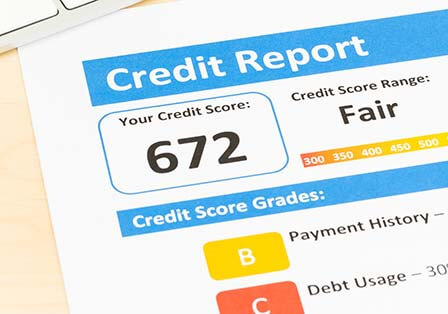Your credit score is a calculated numerical summary that is taken from the information in your credit report, and is calculated via a formula that is taken from all three credit reporting bureaus.
The formula used to calculate your credit score takes into account several factors, including:
• Your length of credit history
• The types of credit you use
• Your current debt levels
• Your credit performance or repayment history
• Any new credit you are trying to apply or have applied for in the past 12 months
How Your Credit Score Affects You
 The way banks see it, your risk factor is higher if your credit score is lower. A low credit score tells them that you have a bad repayment history with other creditors. And if you are considered a high-risk borrower then banks tend to use a ‘rate-for-risk’ approach when it comes to determining what interest rates you will be charged. You will probably receive higher interest charges if your bank sees you as a high-risk borrower.
The way banks see it, your risk factor is higher if your credit score is lower. A low credit score tells them that you have a bad repayment history with other creditors. And if you are considered a high-risk borrower then banks tend to use a ‘rate-for-risk’ approach when it comes to determining what interest rates you will be charged. You will probably receive higher interest charges if your bank sees you as a high-risk borrower.
Alternatively, if you have a high score, then you are likely to be offered the best interest rates. Banks view individuals with high credit scores as ‘low risk’ because it shows that they have a good repayment history. Banks tend to reward individuals with a good credit score as they are likely to pay their bills on time and remain good clients.
Ranges of Great to Terrible Scores
Credit score ranges from 300 to 850. Most individuals have scores in the upper 600. The average in America is around 720. The higher the score the less risky you are to employers, insurance companies, landlords, and banks.
Following are the ranges of great to terrible scores:
• 750 and above: Excellent
• 700-749: Good
• 650-699: Fair
• 550-649: Poor
• 550 & Below: Bad
Factors That Affect Your Credit Score
You probably already know that your credit score is affected by late payments on bills. Payments over 30 days late, delinquent accounts, any accounts turned over to a credit agency or bankruptcies and collection are shown on your credit report and they reduce your credit score accordingly.
Apart from the above-mentioned factors, your score could also be affected negatively if you have higher than normal amount of ‘hard’ credit applications in your credit report in the past 12 months. Hard inquiries are those that are generated every time a company or lender accesses your credit report for the purpose of extending credit. The more times you apply for credit in a 12-month period, the more negatively it will affect your overall credit score. A high level of available debt is another thing that can really reduce your score.
Ways to Improve Your Credit Score
Avoiding excessive inquiries, keeping balances low on revolving debt, and paying your bills on time can really help improve your credit score. On the other hand, having too many accounts, racking up excessive credit card debt, and making payments 30 or more days late can hurt it. So, be careful about these things.
The Travis Law Firm provides professional legal representation for Chapter 7 & Chapter 13 bankruptcy services for residents of all cities in Riverside and San Bernardino Counties. We have offices in Riverside, San Bernardino, Victorville, Temecula, Cathedral City and Ontario for the convenience of our Inland Empire, High Desert, and Coachella Valley clients. For more information about our bankruptcy law services and other legal representation, call us today at (951) 274-9501 or (951) 274-9501.
